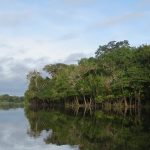 April 30, 2018 1:59 am
Published by Climate Extremes
April 30, 2018 1:59 am
Published by Climate Extremes
Centre of Excellence researchers have identified 12 marine heatwave types off the east coast of Tasmania, a location recognised as a global warming hotspot. Here the average sea surface temperatures here have been rising at four times the global average and trends in marine heatwaves are showing significant increases in number.
 April 26, 2018 11:41 pm
Published by Climate Extremes
April 26, 2018 11:41 pm
Published by Climate Extremes
World-first modelling research– which used several million CPU hours in Australia’s fastest supercomputer, Raijin, and ran calculations non-stop for over a year – has revealed the Southern Ocean mixes water between the depths and surface far more easily than previously thought.
 April 17, 2018 3:49 am
Published by Climate Extremes
April 17, 2018 3:49 am
Published by Climate Extremes
In 2005 the Amazon experienced a once in a century drought. Five years later, in 2010, it was struck by an even worse drought, with even lower rainfall occurring in the dry season. However, the response of the Amazon forest to these two once-in-a-century events showed marked differences.
 April 12, 2018 7:56 am
Published by Climate Extremes
April 12, 2018 7:56 am
Published by Climate Extremes
The Centre of Excellence for Climate Extremes was officially launched on Tuesday, April 10, at the University of New South Wales (Sydney) by the Minister for Small and Family Business, the Workplace and Deregulation, The Hon. Craig Laundy MP.
 April 11, 2018 12:50 am
Published by Climate Extremes
April 11, 2018 12:50 am
Published by Climate Extremes
Students and ECRs have an opportunity to take part in a voyage to a standing meander of the Antarctic Circumpolar Current (ACC) south of Tasmania. They will undertake a 3-dimensional survey of the velocity and density structure of the meander, deploy a fleet of EM-APEX profiling floats and conduct time series measurements.
 April 9, 2018 6:30 am
Published by Climate Extremes
April 9, 2018 6:30 am
Published by Climate Extremes
An international study in Nature Communications co-authored by researchers from the ARC Centre of Excellence for Climate Extremes (CLEX) and the Institute of Marine and Antarctic Studies (IMAS) reveals globally marine heatwaves have increased over the past century in number, length and intensity as a direct result of warming oceans.
 April 1, 2018 12:07 am
Published by Climate Extremes
April 1, 2018 12:07 am
Published by Climate Extremes
New research published in Nature Geoscience has found that climate engineering that modifies the properties of the land surface in highly populated areas and agricultural areas over North America, Europe and Asia could reduce extreme temperatures there by up to 2-3°C.
 March 30, 2018 10:06 pm
Published by Climate Extremes
March 30, 2018 10:06 pm
Published by Climate Extremes
There are clear winners and losers for wind power generation across Australia in the century ahead even though climate change will have little impact on wind speeds, according to new research by the ARC Centre of Excellence for Climate Extremes and School of Photovoltaic and Renewable Energy Engineering at UNSW.
 March 19, 2018 1:23 am
Published by Climate Extremes
March 19, 2018 1:23 am
Published by Climate Extremes
The Australian Academy of Science with 21 other Commonwealth National Academies of Science and societies as part of a consensus statement calling on the members at the next Commonwealth Heads of Government Meeting (CHOGM) to use the best available science to guide action on climate change. The call comes at a time when research has shown that the commitments of the Paris Accord agreed to by international governments will still put the world on track for temperatures 3°C above preindustrial temperatures.
 March 13, 2018 11:48 pm
Published by Climate Extremes
March 13, 2018 11:48 pm
Published by Climate Extremes
Understanding which plant species can recover from drought, under what conditions and the processes involved, will help researchers predict plant mortality in response to global climate change. In response to drought, some species die because of embolism-induced hydraulic failure, while others recover, following rehydration. This research focuses on structures and processes that might allow some plants to recover from drought stress via embolism reversal.










